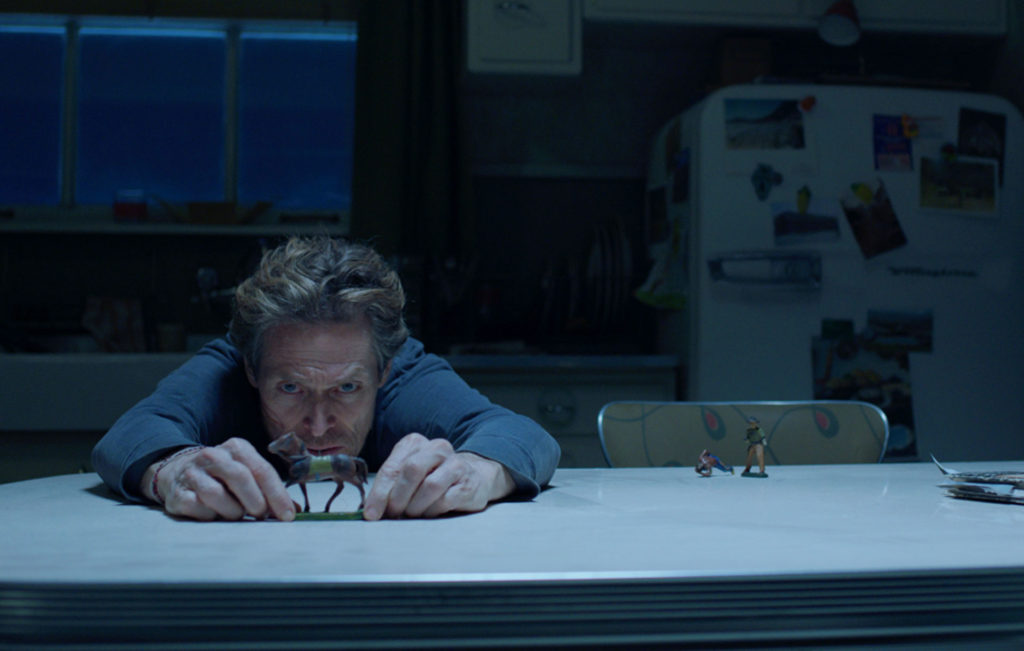Capsule reviews for June 18

Willem Dafoe stars in SIBERIA. (Photo: Lionsgate)
The Birthday Cake
Even if this gangster saga has a respectable cast and gritty nostalgic verve, it feels more familiar than fresh. Set in New York, it chronicles a legacy of betrayal and violence in an Irish-American mobster family through the eyes of Gio (Shiloh Fernandez), whose father was murdered a decade earlier. When asked to deliver a cake to his crime-boss uncle (Val Kilmer), Gio meets some rivals and is forced to confront secrets from his family’s past. Rookie director Jimmy Giannopoulos brings some visual flair to a cliched and episodic story that struggles to generate consistent tension. The ensemble includes Ewan McGregor, Lorraine Bracco, and William Fichtner. (Rated R, 93 minutes).
A Crime on the Bayou
More than the legal injustice suggested by its title, this compelling documentary effectively shines the spotlight on two unheralded civil rights heroes. Specifically, director Nancy Buirski (The Rape of Recy Taylor) revisits a 1966 small-town Louisiana case in which Black teenager Gary Duncan, during a volatile period of desegregation is arrested for simply touching a white classmate on the arm. With the help of a Jewish lawyer, Duncan’s case reaches the U.S. Supreme Court, where it yields a landmark ruling. Technically, the film is messy and the bluesy score is overbearing. But it presents an insightful overview of systemic racism and political corruption at the time. (Not rated, 89 minutes).
Gaia
Steadily building tension and subverting genre cliches, this slow-burning South African thriller is vivid and atmospheric. It follows Gabi (Monique Rockman), a forest ranger who becomes stranded while on a remote assignment in the jungle. She is rescued by a father-son tandem of off-the-grid survivalists, but as Gabi recuperates, she shifts allegiances in their fragile dynamic. Meanwhile, danger lurks outside, where an evil presence turns human victims into flesh-eating mutants. Even when the story starts to spin its wheels, the offbeat film from director Jaco Bouwer remains creepy and immersive, gradually developing an emotional resonance to match the visual intensity of its dystopian vision. (Not rated, 96 minutes).
Les Notres
Beneath its contrived surface, tension simmers throughout this character-driven French drama juggling themes such as political influence and corruption, subconscious bias, reproductive rights, social climbing, residual grief, and fractured families. A small town is shaken when a 13-year-old girl (Emilie Bierre) becomes pregnant, but she won’t reveal the identity of the father. Was she raped? Is it the adopted immigrant son of the mayor she’s been hanging out with? Or what about this mysterious boyfriend nobody’s ever met? The central mystery takes a backseat to the way the incident tears apart the fabric of two families, as the sharp performances help escalate the tension. (Not rated, 103 minutes).
Siberia
Willem Dafoe’s latest collaboration with provocateur Abel Ferrara (Pasolini) is a stark and incoherent meditation on dreams and isolation that’s likely to leave most moviegoers emotionally stranded in the cold. Inspired by the writings of Carl Jung, the story finds Dafoe playing Clint, a bartender in a snowy mountain cabin whose interactions with the eccentric customers take a backseat to what’s transpiring inside his tortured head, which is haunted by memories both real and imagined. The resulting character study yields moments both provocative and profound, although it’s mostly a muddled compilation of self-reflexive imagery that becomes more tedious than thrilling. At least we understand Clint’s frustration. (Rated R, 91 minutes).
The Sparks Brothers
More than just an introduction to an obscure band, this deep-dive documentary from director Edgar Wright (Baby Driver) overflows with his affection for Sparks, the quirky California pop-rock outfit founded by siblings Ron and Russell Mael. Boasting an impressive roster of interviewees, the film traces their beginnings during the late 1960s, their offbeat approach to songwriting and stage performances, their enduring cult following in Europe, and staying true to their creative style often at the expense of commercial success. With style and attitude to spare, Wright’s enthusiasm sometimes clashes with his exhaustive attention to detail. Yet he gives his subjects and their legacy a worthwhile spotlight. (Rated R, 140 minutes).